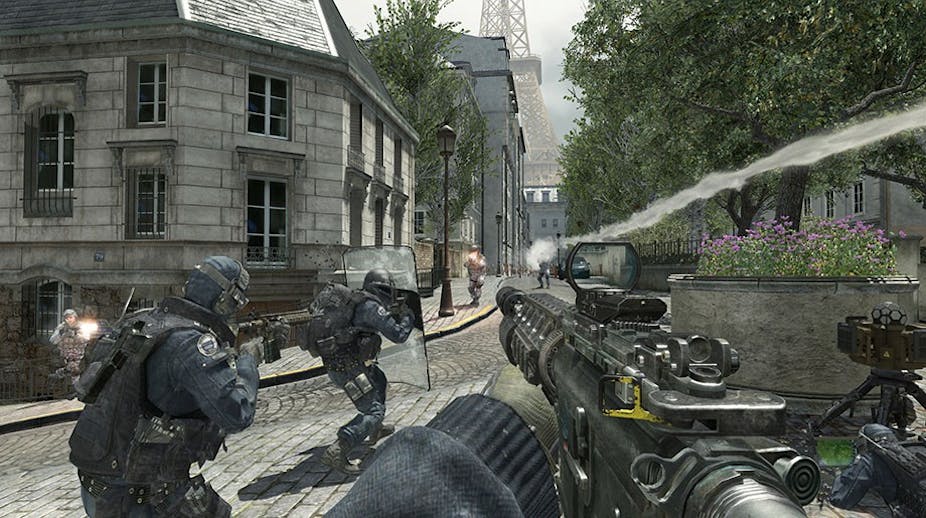The Red Cross has called for makers of videogames to more actively embed and interrogate the laws of war by, for example, punishing players for killing civilians or using torture to gain information. However, attempts to explore war in a more sophisticated way in video games are often greeted with criticism from the media. It seems like the industry just can’t win.
Understanding that calling for simplistic solutions such as confronting players who fail to play by the real life rules of war with a “game over” screen is not likely to hold much sway, the Red Cross has suggested that games should be designed which open up spaces for reflection on the realities of warfare and the ethical minefield which is the contemporary battlefield.
The charity is in part right. Military videogames do tend to avoid the portrayal of civilians and avoid any sense that war yields civilian “collateral damage”. In real life, news brings war into the living room through civilian deaths. But games try to avoid controversy by making sure civilians are simply absent from their battlefields. In the recent Call of Duty: Modern Warfare 3, the player is fighting on the streets of Paris with tanks, heavy weaponry and inevitably causes widespread destruction of buildings. Yet there are no civilians in this fictional Paris and no apparent collateral damage.
Even more problematic is the role of interrogation and torture in videogames. Torture is integral to both the story and gameplay in big titles such as Call of Duty: Black Ops and Splinter Cell Conviction. Only by breaking the rules of real warfare can the player gather mission critical information which unlocks the narrative. The games are set up so that mission critical information is yielded quickly and reliably - the message of the game is clear, namely that interrogation and torture are effective and justified for the greater good.
In this case, a constructive approach to the Red Cross’s complaint might be to develop a game in which torture either yields inaccurate information or no information at all, or if it took a significant time to yield information from a victim. This is how gameplay mechanics can open up spaces for reflection.
It’s in the game
However, it is important to emphasise that the Red Cross critique misses the rich tapestry that is contemporary gaming. At one level, there are already a number of games by politically motivated activists that do offer spaces for social critique and reflection on the nature of contemporary war. Perhaps most successful of these is September 12, in which the player can undertake remote strikes on an unnamed middle eastern village. However, these invariably result in the death of civilians, resulting in the mourning of friends and family who then morph into terrorists. The message of this game is even more clear than that of Call of Duty - the war on terror cannot be won by military action which will only escalate the violence.
The highly successful Metal Gear Solid franchise also contains a narrative that is strongly critical of contemporary war. Players who kill their opponents are punished with almost certain death. The game is in fact much easier if the player avoids shooting and operates with stealth. Thus Metal Gear Solid and its (albeit limited) ilk suggest that imaginative design can open up very different ways of playing and experiencing war.
Who can’t handle the truth?
So games that force us to think about war do exist but that doesn’t necessarily mean we are ready to play them. Historically, when games try to engage with the issues raised by the Red Cross, the political and social reaction has been vociferously critical. An infamous example is Call of Duty: Modern Warfare 2’s airport massacre sequence. Here the player is a counter-terrorism operative working under cover in a terrorist cell. It was rightly criticised because regardless of whether you choose to shoot civilians in the airport or not the consequences are the same - the player is killed by terrorists.
The game would have been more interesting if you could have turned your gun on the terrorists with consequences for the story. It could have explored more complex issues such as how far the player would go to prevent greater catastrophe. Yet given the media furore, the lesson is that it is perhaps easier to remove civilians altogether.
In another controversy, the proposed game Six Days in Fallujah set out to explore ethical questions around one of the bloodiest battles of the Iraq war. The game was almost immediately embroiled in a political maelstrom and Konami, its proposed publisher, ultimately withdrew, suggesting that games were not yet ready to handle such controversy
So while the Red Cross is right to raise concerns with videogames, there are some clear indications that the industry is already taking steps to reflect on these issues. For their attempts to work, we need to be socially and politically ready to accept the consequences. Can we trust the player with their finger on the virtual trigger? Perhaps more importantly, can we trust the media and social commentators to desist from sensationalist reporting about games which allow for the possibility of civilian massacres? The nature of the earlier reporting on Six Days in Fallujah suggests that the players and industry may be rather more ready to meet the Red Cross’s call than the media.

